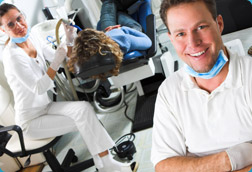Dental Specialisms
Dentistry is a complex and ever-changing field of expertise. When patients require more specialist treatments, general practitioners will often refer them to a specialist with additional training in that area. This ensures that the patient receives the highest quality care, based on the latest, most up-to-the-minute techniques and dental best practice. It also takes the pressure off the general practitioner, who can focus on higher volume, more routine dental work.
What does the job involve?
There are nine types of dental specialist:
Orthodontists specialise in straightening crooked and misaligned teeth through the application of braces and retainers.
- Oral and Maxillofacial surgeons have expertise in issues surrounding the mouths and jaws
- Pediatric specialists focus on preventative dentistry and oral health care for children
- Periodontic specialists are trained to treat gums and problems caused by gum disease
- Prosthodontists treat patients with missing teeth, through solutions such as crowns, implants and dentures
- Endodontists treat patients with infected pulp in the inner tooth
- Public Health Dentists explore opportunities to improve dental health in our communities
- Oral and Maxillofacial Radiologists use the latest imaging technologies to identify head and neck problems, which can be closely related to dental issues and problems with the temporomandibular joint.
What qualifications do you need?
Dentists who move into specialist areas must already have spent four years studying for a degree in general dentistry and be registered with the General Dental Council. It is also more than likely that they will have spent a significant period of time in general dentistry, building their skills and their understanding of patient care. Often, dentists find that their career naturally moves towards an area of dental specialism to meet the changing needs of their patients.
To become a dental specialist in one of the above mentioned areas, you will then have to study for another two to four years as a postgraduate. In reality, your professional development will probably continue after your formal studies have ended – as most dentists continue to learn and develop their skills throughout their careers.
What are the career prospects?
Dental specialists have a number of career avenues open to them. They can remain as dental specialists and build their own practice. Alternatively, they can continue to study until they qualify as a Consultant, which sees them move up into more of a hospital management role. Finally, they can take their skills into Academia to advance the profession through teaching and research.
Featured Jobs
-
Example Job
- Salary:
- £24,000
- Location:
- Preston, Lancashire
Lorem ipsum dolor sit amet, consectetuer adipiscing elit. Nam nisl ipsum, interdum id, fermentum ut, convallis sed, tellus.
More Info -
Example Job
- Salary:
- £24,000
- Location:
- Preston, Lancashire
Lorem ipsum dolor sit amet, consectetuer adipiscing elit. Nam nisl ipsum, interdum id, fermentum ut, convallis sed, tellus.
More Info -
Example Job
- Salary:
- £24,000
- Location:
- Preston, Lancashire
Lorem ipsum dolor sit amet, consectetuer adipiscing elit. Nam nisl ipsum, interdum id, fermentum ut, convallis sed, tellus.
More Info
